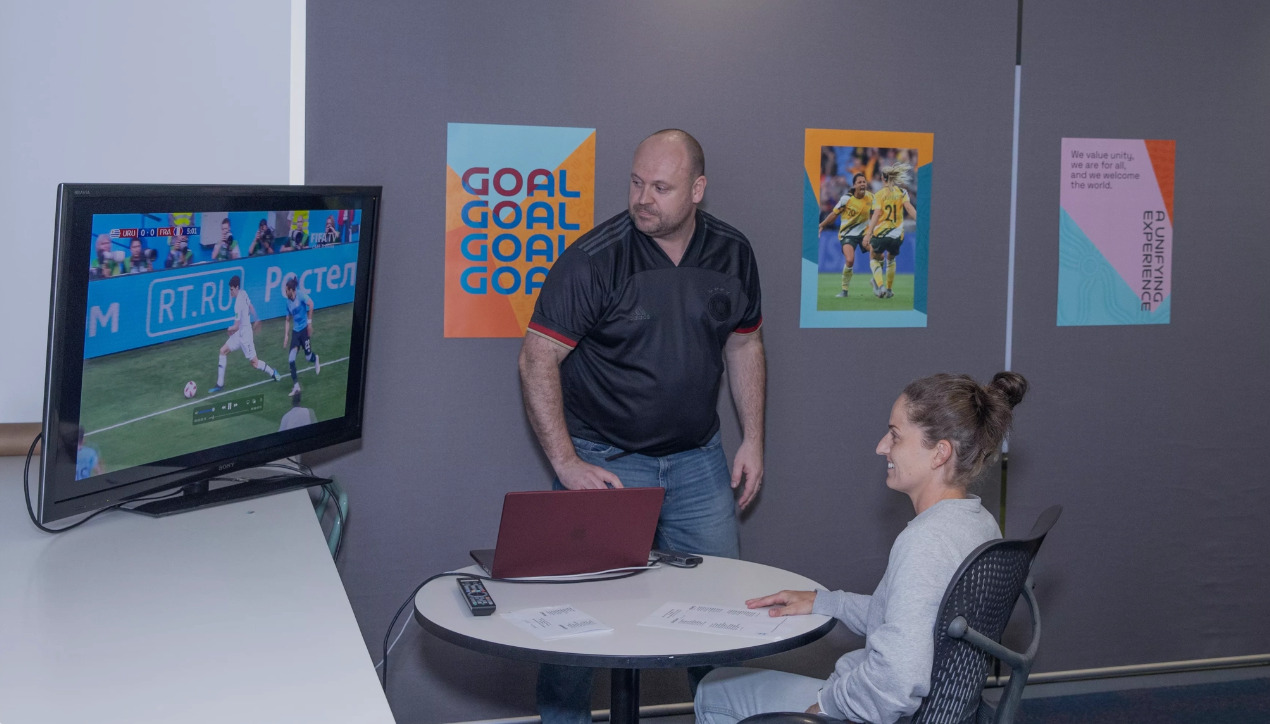
Audio description makes Australia and New Zealand 2023 accessible to the visually impaired

The FIFA Women’s World Cup 2023™ is set to be the most comprehensive edition in the history of the competition. Another step towards this important goal was taken this week.
For the first time, blind and partially sighted football fans will be able to access a detailed account of what is happening on the pitch, while enjoying the atmosphere in the stadiums during Australia and New Zealand 2023.
This service, known as Audio Descriptive Commentary (ADC), has been offered at previous FIFA World Cups, most recently Qatar 2022 – in the respective local languages.
Two-day ADC training programs will take place in Brisbane, Melbourne, Sydney and Auckland/Tamaki Makurao this week and next.
Those potentially required were challenged to make these descriptive audio commentaries, with special training focused on listing all the important visual aspects of the match, namely body language, facial expressions, scenery, movement, costumes, colors and anything that could be used to describe it. Context.
ADC specialist coach Alan Marsh explains that the method follows a traditional radio approach: “If you watch a football match on TV, it’s the pictures that speak, and the commentator can let the pictures speak for him. That’s not possible in audio description. We need to follow the ball.” And move as much as possible.” “If you are visually impaired, you cannot follow these images [télévisées]. Radio has moved away from overly descriptive style to approaching television style. We think ADC is a way to combat this trend.
Canberra United legend and former Houston Dash defender Eli Brush took part in Sydney’s camp this week. She finds it more difficult to improve her skills behind the microphone than behind the ball.
“Playing football is a bit more natural than being on the other side of the camera and talking about it,” Brush explains. “Describe as you go what’s really going on, and follow the ball while you tell someone who has little or no vision of the action that’s going on, it’s all very difficult. But it’s obviously a huge plus for the fans involved.”
“I have always been involved in football and I love talking about it,” she continues. “It’s great to be able to participate in the FIFA Women’s World Cup wherever possible. Here too we can really pass on the love of football to the visually impaired.”
Two special guests pay a surprise visit to the Sydney trainees: Casey Dellacqua, recently named Beyond Greatness Champion, and Ellie Cole, Paralympic athlete which inspired many people. The duo spoke with the trainees and sat behind the microphone.
Seven-time eventual doubles champion and current media commentator Casey Dellacqua is fighting to help women in the media. “When you work in the media, making sure that women’s sport is portrayed and talked about as it deserves is a huge responsibility,” she says.
“It’s very important for women’s sports to have a voice. It’s a topic that fascinates me, because a woman’s voice behind the microphone is so powerful, and it takes more than that,” says the Australian.
Cole is Australia’s most decorated Paralympian, with an impressive 17 medals from four editions of the Paralympic Games. The swimmer, who is now retired from competition, believes accessibility for all people is crucial during major sporting events. “I’ve really seen what inclusive design can do, and what an accessible tournament can do for athletes in particular,” she explains.
“It will be interesting to see this unfold in a tournament that doesn’t necessarily host para-athletes, but really wants the context to be inclusive and the whole experience accessible to all components of the audience. I think the world is changing in a very positive way in terms of accessibility in sporting competitions. . »
Upon reaching the stadium, fans will only need to download the FIFA Interpreting App. The information will be updated regularly until the start of the tournament.
The enhanced ADC experience will be a big moment for blind and partially sighted fans who have felt partially excluded from the game until now.
“Why can’t a visually impaired person attend a football match and follow every step?” Mars adds. “It’s an accessibility tool that allows people to follow a game they may have thought was not possible. »
“You can go to the stadium, launch the app, sit with your friends, parents or anyone else, and enjoy the game from start to finish, with your own commentary.”
Source: fifa.com

“Reader. Travel maven. Student. Passionate tv junkie. Internet ninja. Twitter advocate. Web nerd. Bacon buff.”
